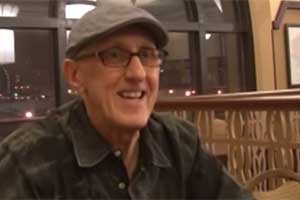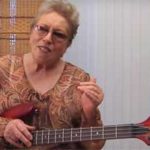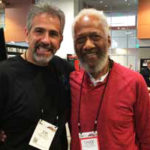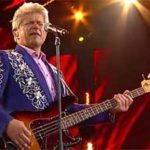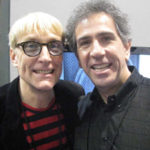Longtime Brian Wilson bassist talks about his days on Chicago Club scene, first encounter with Carol Kaye
Exclusive interview with FBPO’s Jon Liebman
July 10, 2017
Bob Lizik might be best known as the guy who holds down the low end of those “Good Vibrations” for Brian Wilson. But outside of being the former Beach Boy’s bassman, he’s had an impressively eclectic career working with artists as varied as Madonna, David Bromberg, Billy Joel, Barbra Streisand, and R&B/gospel legend Mavis Staples.
Although originally trained to play the accordion, Lizik eventually traded his polka squeezebox for a bass and kicked off his musical career playing the Chicago club circuit. Later he went on to play with singer-songwriter Tim Moore and violinist Jerry Goodman of the Mahavishnu Orchestra and to work in the commercial music field. Right now he’s touring with Brian Wilson on the Pet Sounds 2017 World Tour, currently taking them through the U.K and Europe.
FBPO’s Jon Liebman recently reached out to the veteran bass player to get the inside scoop on his colorful journey through the music world.
FBPO: Chicago has such a rich musical heritage. How do you think growing up there affected your musical upbringing?
BL: My mother’s side of the family was very musical. I have a Polish family background and all my cousins and my uncles and my brother played in polka bands. So we’d get together for a family communion or birthday or something like that and all the instruments would come out and they’d be playing polkas. It was never my type of music, but the musical background was there anyway. I started on accordion when I was 5 because that’s what kids did back then. And I think it got absorbed that way. My dad was a fan of big bands, so I listened to big bands as a kid, Harry James and Dorsey and all those old ‘30s and ‘40s things. That’s where my musical interests came.
FBPO: What made you gravitate to the bass?
BL: I started to play bass because I figured you can’t get many girls with an accordion! [laughs]. I had a local music teacher at one of the little local music schools and he was probably the biggest reason that I became a musician. His name was Harry Grebb. He was a sax player and he played with Woody Herman, back in the day. He inspired me to become a musician. I just liked what he did. His son (Marty Grebb), it turns out, was the keyboard player in the Buckinghams, and went on to play with Bonnie Raitt, Leon Russell, Willie Nelson. So I saw that at an early age and I said, “That’s cool.” Plus he was in a band called The Exceptions and the bass player in that band was Peter Cetera, and I admired Peter. I said, “This is cool. I wanna do this.” I watched Johnny Carson every night and I wanted to be the bass player on The Tonight Show. I thought that would be the coolest job in the world.
FBPO: When I think of Chicago, my mind immediately goes to Muddy Waters and …
BL: The blues?
FBPO: The blues. Like I said, such a rich musical heritage. How much did that influence you, in addition to your teachers and your family?
BL: I think that was a big part of it, what I listened to. I tended to listen to more of the R&B stuff. The drag was, at that time, none of the labels put on who the musicians were. So, you were listening to (James) Jamerson or Chuck Rainey or something, you don’t know who it is. Or Carol Kaye, or Duck Dunn. And you just never knew who those guys were. But that’s the kind of stuff I listened to. And the thing about Chicago when I was a teenager was there were a ton of clubs. So I’d be playing in bands and be lucky enough to play in the clubs. And there were a lot of clubs on Rush Street. There must have half a dozen clubs in the immediate Rush Street area that you could play. And you’d be playing six hours a night. There was nothing like when the bands come in now and they play a set and they leave. This was, you hauled your gear in and you played from 9 till 3 in the morning. And there was a lot of music, so if you did happen to play in a club that got done early, you’d go to the club down the street that was open a little later and get to hear some of the really good bands. I remember listening to Baby Huey & the Babysitters, and even Chaka Khan, when she first started in Chicago with Rufus, if you were lucky enough to see that. There was a lot of music going on in Chicago at that time. I was never particularly, at least consciously, drawn to blues, although all the early rock & roll is just so blues-based. The Stones stuff and all that was just heavily blues-based. So, it got in there somehow. There were just so many places to go at that time and so many places to play at that time, you could work seven nights a week and play different clubs. That’s kind of what I did as a teenager growing up.
FBPO: What about the bass? Once you discovered the instrument, did you have any bass influences, bass heroes?
BL: Oh yeah! I listened to big band stuff. I started playing bass when I was 13, which was like, ’63, so there wasn’t a lot of information out there. There were very few bass books that were of any note at all. They were all pretty simple. My teacher turned me on to Ray Brown and the Oscar Peterson Trio, so I listened to a lot of that stuff. I listened to a lot of Brubeck stuff, so I listened to a lot of bass from that standpoint. Those are still some of my favorite albums. I mean the Oscar Peterson West Side Story album is one of my favorite albums of all time. So I listened to that stuff and then, listening to the Motown stuff that, eventually, I got really hooked on, and picking that stuff up, having learned those songs in order to play the clubs. So you learn those bass lines and that becomes part of your musical education. It’s not like kids now, where everything’s on YouTube, there’s thousands of books out there for methods and there’s every way to learn it. Back then there was just pretty much listen to the records and try to figure things out.
FBPO: Let’s talk about your career. In addition to the Brian Wilson gig, your resume reads like a real cross-section of musical styles and genres, including everyone from Jerry Goodman to Madonna, Mavis Staples, Billy Joel, Barbra Streisand… How did you get established as a working musician?
BL: Let me see… I was in a band that got signed to Warner Bros. back in the late ‘70s. We had an album out and then I was gonna move to LA, and that never happened.
FBPO: What was the name of the band?
BL: Scott Wilk & the Walls. We had one album out on Warner Bros. in ’79. Before that, I had toured with an artist named Tim Moore from upstate New York. He lives in Woodstock. He wrote “Second Avenue” and he had a bunch of other things. He was on Elektra/Asylum. And I did four albums with him. When Scott Wilk & the Walls folded, I didn’t move to LA. I had friends that were doing studio work in Chicago, doing commercials. At that time, Steve Rodby was the main bass player in town and he had just gotten the gig with Pat Metheny. So he went on tour with Pat and this hole opened up in the studio thing and a couple friends that were doing that recommended me and I started working in the studios for pretty much the next twenty years. I did predominantly jingles.
FBPO: That would have been, what, late ‘70s, early ‘80s?
BL: ’81. I started doing commercials in ’81. And it was great because I was able to stay home with my family and make a living and because I was making enough money doing commercials that I could play the clubs at night. I didn’t have to worry about, you know, making thirty dollars at the door. It was just a chance to play the kind of music I wanted to play, whether it was big band, or backing up a chick singer, or some fusion band that I was able to play with. It was an opportunity to make music at night and make money during the day. So I did that.
I met Jerry Goodman and I joined his band in ’84, ’85, somewhere around there. [Having gotten to know] a couple producers, I’d be lucky enough to play on somebody’s album at that point. There wasn’t a lot of that work in Chicago. I got a little bit of it, but it was predominantly jingles – McDonald’s, Ford, Budweiser, all that stuff, because Chicago was a huge jingle market at the time. I know they don’t like the name “jingle” any more, but a huge commercial industry. I had a lot of work at that time, basically till the late 1990s. Then it started to slip down. I think [because of] technology, guys didn’t have to hire musicians, because you were able to get drum sounds and great loops and great bass sounds and stuff. And budgets got cut, et cetera, et cetera, so some of that work went away. Simultaneously then, I hooked up with Brian.
FBPO: How did that gig come about?
BL: I used to do a lot of work for a guy that produced a couple of Brian’s albums, Joe Thomas. Joe was a part owner of River North Studios and he also had a couple record labels that he was associated with. I worked with Joe and he was doing Brian’s Imagination album in ‘98 and he was using mainly Nashville guys. He was going down to Nashville to do that and he called up one day toward the end of ’98 and said, “I got a couple more tracks to finish. You wanna play bass on Brian’s album?” And I said, Yeah! Of course. So Joe gave me the opportunity to play bass on a couple songs. Then in ’99 they decided to tour to promote the album. It was going to be half a dozen dates or so. And that half a dozen dates led to another half a dozen dates, and that led to going to Japan, and that led to, 18 years later… So that’s how that happened. Joe hooked me up with Brian on the album, then the band got put together using The Wondermints from LA, because I guess Brian and Melinda (Ledbetter) had heard those guys and it’s a great band. They came to Chicago and half the guys in the band were from Chicago. So we kind of put that together and rehearsed out in St. Charles for the first tour.
FBPO: How would you describe working with Brian? I know that’s a loaded question, but you’ve been with him for a long time.
BL: I had been a moderate fan of The Beach Boys. There was a particular era when I was growing up that it was real popular. I have an older brother and he and his friends listened to all the car stuff, you know, “409” and all that stuff. And then I got kind of hooked on Summer Days (And Summer Nights!!) and that album, and I dated a girl that was in The Beach Boys fan club. [laughs] But that all dropped off the map for me and I was listening to other things, like I said, predominantly R&B stuff. When I got hooked up with this, I thought, piece of cake, it’s gonna be all surf stuff and de-de-de-de, de-de-de-de. I had no idea how deep it really was until I actually had to start figuring this stuff out. I got recordings and I’m going, “This is pretty amazing. There’s a lot more going on here than I thought.
And then meeting him… at first Brian was more shy at the time. He was not used to us, all the new people that were coming around him. But gradually, he warmed up to us and he opened up a bit and then we’d start learning new material, where he starts showing us old stuff. We’d start playing it and he’d look around and he’d go, “You’re playing the wrong note” or “You’re singing the wrong note.” And you start realizing, “Oh, this shit. This guy still has it all together in his mind. He still hears everything you’re doing, even though he’s [only] got one [functioning] ear. He hears everything. If you’re playing the wrong note, he’s gonna tell you you’re playing the wrong note. And if you’re singing the wrong note, he hears it. A number of times in rehearsals, he’d stop and he’d point things out. “This is not right.” And he’s spot on. He knows exactly what he wants and he’s kind of semi-dictating it to you. At one point, I asked Carol (Kaye), “Did you make up these lines, with Brian getting credit for it?” and she goes, “No, he knew what he wanted. He would point us in a direction and say, “I want this kind of thing.” A lot of times he would hum a line or dictate a line verbally,” which is what he was doing to me when I’d play. The same thing with drums. His drums are very uncommon. Very rarely is it just a straight drumbeat. He’s always got some more orchestral thing coming out of a drummer. It’s really cool. When you see him dictating a new vocal part to somebody on a new song and he’s, “You sing this, you sing that, and you sing that” and you hear this stuff and you go, “Oh, shit. The guy’s a genius!” You can hear this stuff. He said he hears everything in his head all at one time. I think that’s very difficult when you hear everything in your head and it’s frustrating trying to get all of that out. You hear it how it should be and you’re trying to tell people how to play what you hear in your head. It’s kinda hard.
FBPO: How much did you find yourself trying to emulate Carol Kaye’s bass sound? Are you able to inject your own personality into the music?
BL: From early on, I’ve always tried to emulate Carol as much as I could. Brian likes playing with a pick, so I found myself having to play more and more with a pick, which is something I didn’t do before Brian. I rarely used a pick, but he likes it. I think that’s one of the things he really liked about her sound, because there was a point to it. There’s so much definition in her sound and I think he liked that a lot. So I found myself playing with that.
The first time I met Carol was the first time I played in LA and she was backstage between the first half and the second half of the show. I’m pretty much cotton-mouthed the whole first set because I know she’s out there. And the first thing she said to me was, “You need to put more treble on your bass and stick some tissue paper under your strings!” And I was like, “Ohhh kay.” I said most of the sound was coming through the big system and it’s up to the guy at the front of the house. But the muting is something I did try to emulate, muting and trying to get the definition out of the note that she gets. And it’s really important. I mean most of this stuff – you can’t change the bass lines on Pet Sounds. I mean they are what they are. You can’t change the bass lines on most of the old Brian stuff. I do take some liberties on some of the old car songs, the stuff that Brian played, just adding a little more movement to it. But you don’t change the bass line on “California Girls” or “Good Vibes” or “Wouldn’t It Be Nice.” “Wouldn’t It Be Nice.” is one of my favorite bass lines of all time. I think it’s right up there with Jamerson’s “What’s Goin’ On.” It’s a perfect line. It outlines the chords, it moves the song along, it moves it in the right direction, as do many of the other tracks on Pet Sounds. It’s beautiful music, man, and I’ve just grown to appreciate Brian’s music and Brian as a person so much in the last 18 years. He’s a great guy. I love him. I couldn’t say a bad word about Brian if you put matches under my fingernails. He’s honest, he’s kind and he’s brilliant too.
FBPO: What can you tell me about Brian that most people don’t know? What kind of misconceptions do you think exist about Brian? He’s kind of an enigma.
BL: I think people think it’s a drug thing. I think people think that he was a heavy druggie and that’s why he is the way he is. Admittedly, he admits he did do drugs and he also says he regrets it. Personally, I think there were the problems of depression, auditory hallucinations. I think there were things in his life that caused him to do drugs when he did do them in order to silence the voices he was hearing in his head. I don’t think people realized that he heard voices in his head that were telling him bad things. They were telling him they were going to kill him. Where those voices came from, I don’t know. And I don’t know what the cause of it was. Nowadays, there’s so much education out there regarding children’s health and mental health that there wasn’t back then. I don’t know if it was something he was born with or something that developed because of the stories of his relationship with his father. I don’t know. But I think the biggest misconception is that he’s a drug-addled old man, and that’s not true at all. He’s had an immense share of problems in his life. I just think it’s the voices and the depression and the things that have dragged him down that caused him to go to take some drugs to relieve the voices or to relieve the depression or the pain. I think that’s the biggest misconception.
FBPO: What else is keeping you busy these days?
BL: Well, the last two years with Brian have been so busy, I haven’t had time for anything else. We did 99 dates last year. I was out from March till December, and this year he’s got almost as many gigs. I’ve got two weeks off now and that’s being dominated by my grandsons! [laughs] Like I said, I used to do a lot of jingle work in town, commercial work, and that’s kind of dried up a bit, so when I do have the time, I do some writing on my own. I’ve got songs that get picked up for incidental music. I used to do a lot of stuff that got played, incidental music on Oprah and some of the stuff has wound up on Kardashians or some other cable show. I’ll get my BMI statements and I’ll find out that, oh, something I wrote showed up on this show or something. There’s a piece of incidental music. So I’ve been doing that. I’ve been writing for a couple music libraries, and I write with a couple other friends in town, just trying to keep fresh.
FBPO: Tell me about your equipment.
BL: I use Lakland basses. I’m a huge fan of Lakland, but on this past tour, I started using Fender. The Beach Boys used to play Fenders. I love ‘em. They sound great and they feel good. I still play my Laklands. My Laklands are currently in Europe because we have two sets of gear. So my Laklands got shipped to Europe, along with an Ampeg SVT Pro4V I think is the name of the amp. And that’s all in Europe, so we don’t have to rent gear when we go over there. It’s too expensive to rent.
FBPO: And I know you’re big on GHS strings.
BL: I love GHS! I’ve been using GHS strings since 1980-something. I’ve given away so many sets of GHS strings to bass players! They last a long time, if you don’t get a chance to change them. When I was busy playing jingles, I would change them often because I wanted to. But if you don’t get a chance, they stay bright, they stay in tune. I never ever had a bad string in a set, which I can’t say about a lot of the other companies I’ve used. The standard strings I use are GHS Super Steels, medium gauge. That’s what I use predominantly. I have a ’65 Jazz I use when I do some remixes, like on the Madonna stuff and the Mariah Carey stuff, I use a ’65 Jazz with GHS flatwounds on it. Currently, on tour, I’m using the GHS black tapewounds for the P bass and I’m using Super Steels on the Jazz bass. I’ve never had them go bad, and there’s been times when I have a bass that I haven’t played in a couple months, sitting in the closet, and somebody will want that particular bass sound, and I’ll pull it out and the bass strings sound as bright as they did on day one. I don’t know how many sessions I can do before the set will go dead sounding. I’ve actually tried. I’ve left strings on and used them over and over and over again and it’s been a couple of months before I had to change them because they may be a little dead sounding. I can’t say enough good things about them. The intonation on them is fabulous. They just sound great. Super Steels are, by far, my favorite strings, ever.
FBPO: What lies ahead? What else would you like to do that you haven’t already accomplished?
BL: I keep threatening to do an album. I’ve got a bunch of stuff in two different categories that I want to do, songs I’ve written. I keep threatening to do it. Part of me is, you know, you get afraid of the criticism that you might receive with anything, but I’ve got enough stuff written now for an instrumental album, not necessarily like a bass chops album, but just songs with bass leads on them. I’m gonna get it done eventually. I’ve got enough material written for it now, it’s just a matter of getting – you know, you keep changing things. I keep writing things and, “Maybe I should change the bridge on this a little bit,” but that’s the main thing I really want to get done. I think I’m gonna concentrate on that around the holidays this year. I think we’re taking a break toward the end of the year, so maybe I’ll work on it at that point.
FBPO: What would you be if you were not a bass player?
BL: I don’t know what I’d be. I’ve always liked history. I think maybe I’d be a history teacher. I’m a big fan of American history. I never gave it much thought. I think around the age of 12 or 13 I decided I want to be a musician and I’ve been lucky enough to do that my whole life.
